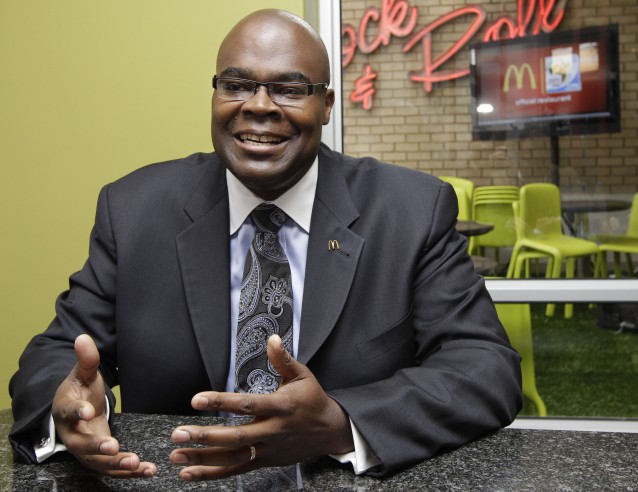
McDonald’s CEO Don Thompson
CREDIT: AP
McDonald’s CEO Don Thompson, one of just seven African-American chief executives among the Fortune 500 companies, is stepping down less than three years after rising to the top job.
Thompson’s exit is being widely blamed on the company’s weak financial performance under his stewardship. But McDonald’s next CEO will also face numerous public relations problems, widespread labor unrest, and legal threats to its business model.
As the S&P 500 gained 11 percent collectively in 2014, McDonald’s stock price fell. Company stock “has been basically flat” in Thompson’s two-and-a-half-year tenure, “a period when the Dow Jones Industrial Average rose 36 percent,” the Wall Street Journal notes.
Some analysts directly faulted Thompson’s leadership for the company’s poor financial performance. “Don got fatally behind the last couple of years,” a restaurant specialist from a management consulting firm told the Journal. “The company was not going to be fixed until Don Thompson (left),” another industry analyst told Crain’s. McDonald’s ability to compete with so-called “fast casual” food stores with more customizable menus and fresher ingredients will drive its near-term performance for its shareholders, and how Thompson’s replacement tackles those core business questions will probably be the primary determinant of his or her lifespan in the CEO’s chair.
But whoever ultimately replaces Thompson will also have to tackle some more abstract types of damage to the brand, which has become the face of low-wage worker exploitation as fast food worker strikes spread from a New York McDonald’s to hundreds of cities around the country.
Workers demanding a $15 hourly wage and the right to unionize have taken an increasingly radical approach toward McDonald’s. At a gathering last spring, workers from the movement resolved to start using civil disobedience as an organizing tactic. Over 100 McDonald’s workers were arrested at the company’s annual shareholder meeting in Illinois last summer, with police in riot gear deployed to protect the corporate campus from strikers and protesters. As recently as last summer, workers alleged that they had been fired or otherwise illegally disciplined by the company for participating in strikes.
While the campaign is now industry-wide, a couple of major stories have helped to associate McDonald’s with the economic insecurity that’s driving those workers to strike. In the summer of 2013, ThinkProgress reported that the company was maintaining a website full of implausible budgeting tips for workers. The sample budget provided by the company purported to show how a McDonald’s worker could not only survive on their wage, but thrive, setting aside savings for themselves and their family. But that portrayal of life as a fry cook relied on some dubious conditions, like spending zero dollars per month to heat a home, paying $600 in monthly rent, and finding a second job. Near the end of that year, the company quietly took that site private, citing “unwarranted scrutiny and inappropriate commentary.”
McDonald’s frontline workers earn less than $8 per hour on average according to Glassdoor, and the average salary for fast food workers across the industry is less than $19,000 per year. While those are poverty wages for many, Thompson had said the company pays “fair and competitive wages.” Wage theft is rampant in the industry, according to a worker survey from last spring. Recent research from the University of Massachusetts-Amherts shows that the fast food industry as a whole could absorb a minimum wage increase to $15 an hour without layoffs or reducing profits.
The company’s failure to address its workers’ demands may ultimately destroy the legal arrangement fast food companies use to avoid liability for the labor conditions their workers face. Franchising agreements have long protected corporate parents from responsibility when their franchisees are found guilty of violating labor law, but the National Labor Relations Board now says that McDonald’s exerts so much control over local operations that the corporation itself can be charged in such cases.
Thompson’s exit compensation will likely not become public until April when corporate filing deadlines hit, and it is not clear if he will receive a “golden handshake” or have some of his past years’ compensation clawed back. Thompson reportedly earned a combined $17.9 million in 2011 and 2012, and a further $9.5 million in 2013. Much of that pay came from stock options that do not vest immediately, and the company’s poor performance in 2013 cost him $600,000 in incentive pay. If Thompson’s performance costs him anything on the way out the door, that would defy the trend in corporate compensation for failed executives.
CEOs in the fast food industry as a whole earn 1,200 times what they pay their uniformed frontline employees. With tax write-offs for executive pay, and workers paid so poorly they must rely on public assistance programs despite punching a clock, these companies’ business model receives hundreds of millions of dollars in taxpayer subsidies every year.
















